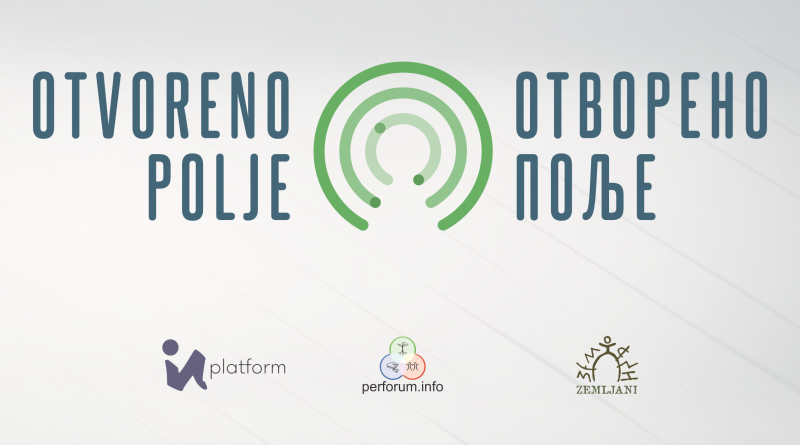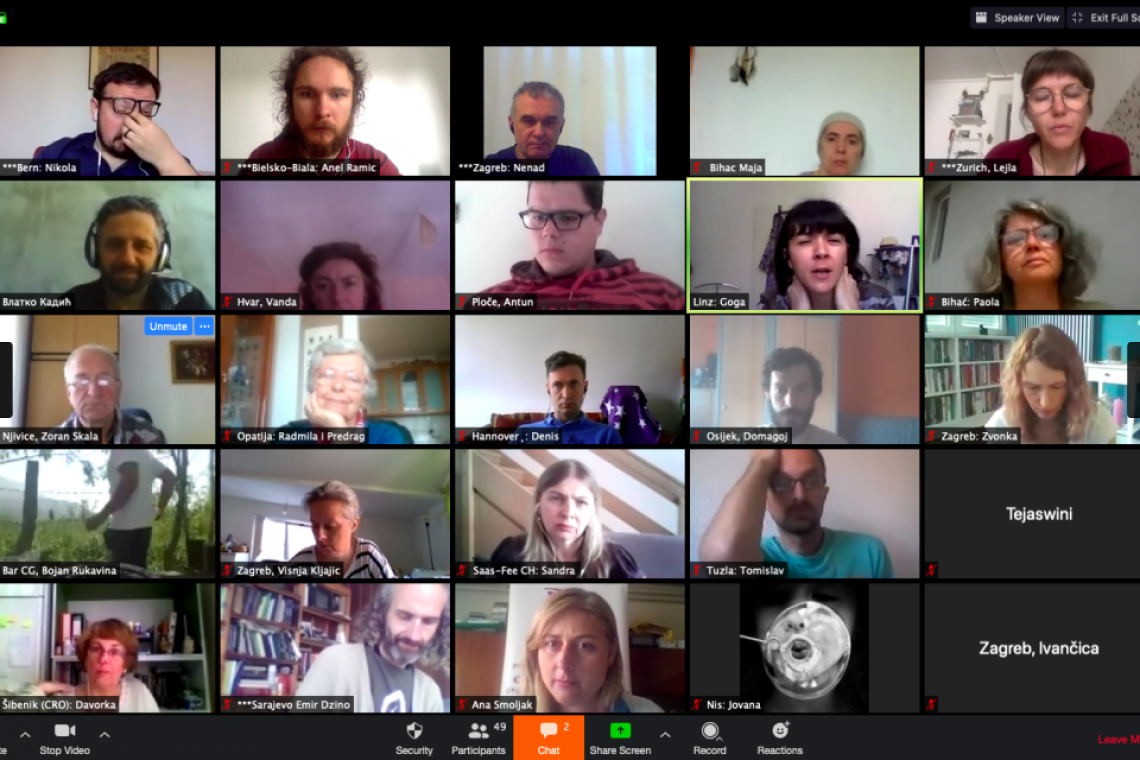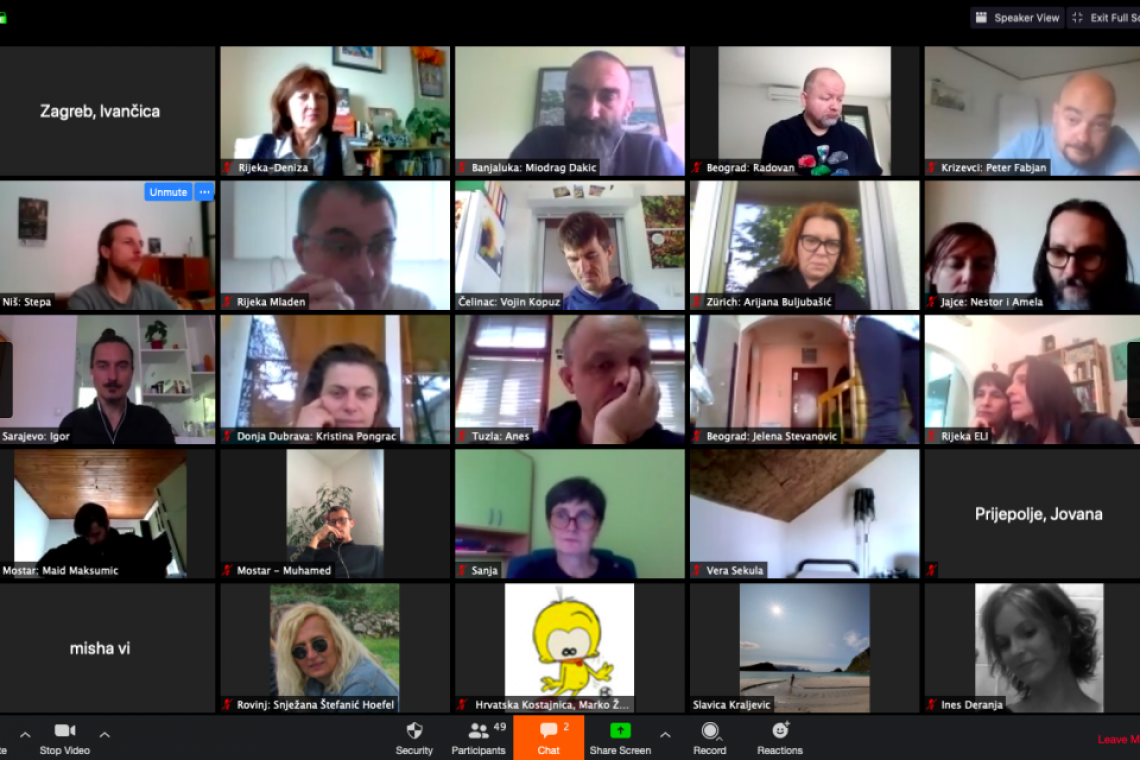Otvoreno polje (Open Field) – a brief overview of the themes that are important to us
A schedule was agreed after that and each participant, depending on his/her needs and interests, could move between the "rooms" in which discussions where going on in smaller groups. High spirits, enthousiasm, the desire to get to know each other and connect, never slackened during four very intensive hours of commom experimentation. For all those who were not able to join us this time, we have resumed here the content of all our thematic discussions.
The importance and methods of conservation of old-time varieties
This theme was initiated by Vojin Kopuz, one of the main experts of conservation of old-time varieties in the region and the founder of the Factory of joy seed bank. The participants in this discussion were offered an overview of what old-time varieties are, why their conservation is important, what is their difference with heirloom varieties and how to borrow seeds from Vojin's bank.. Comments and reflections were inspired by the shared information and flowed naturally. The group discussed, among other things, about the possibilities to promote the awareness and knowledged of old-time varieties among conventional farmers, the transfer of this knowledge via formal school education and the organization of practical workshops. Information was shared about other existing seed banks in the region, operating in the framework of the ZMAG NVO in Vukomerić (Croatia) and the ecologic movement Okvir Života in Paštrić (Serbia). The discussion on this theme will continue. If you are interested in joining, write a message nasesjeme [at] staresorte.com (here).
Our life stance
The participants to the discussion on this theme considered the importance of developing their own values and priorities, and the way the actions of the individual influence collective consciousness. The importance of propagating the idea of permaculture as a sustainability tool for local communities in a time of global crisis is another subject that was discussed by this group.
Climate and ethics in kindergartens and schools
This theme was proposed and moderated by a participant who has several years of experience in preschool education. She shared with all the interested participants her insight on the current shortcomings of formal education when it teaches children both about nature and in nature. The group then elaborated some common proposals for possible solutions to this problem: educating permaculture teachers to work with children, setting up small showcase gardens in kindergartens, lectures for parents on the ecological footprint, interpersonal connection and collective responsibility. If you think that you can contribute to the creation of new ideas on this theme and you want to take part in future discussions, get in touch with us here.
New (regenerative) planetary economy
During this workshop, the participants interested in this theme discussed the problems of the current global economy, money as a psychological construct and the way it is created. The documentary movies Autogestió: adventures into the new economies of Catalonia and Money & Life were included in the notes available to the participants. After a detailed presentation of the issue, the discussion touched upon alternative solutions for the local but also for the global economy, with systems such as Reconomy, FairCoop and the CAREconomy. If you want to join the discussion on regenerative economy, contact Nikola, the initiator of this theme, nikola [at] dezentrale.org (here).
VASTU houses
This ancient architectural system was the inspiration for a very interesting and broad discussion. Theoretical and practical information was shared, on design, layout, measurements, ground preparations, space arrangement and spatial geometry, according to Vastu. This system is not only applicable to houses and other buildings, it can also be used to design entire towns. The most widely known examples of Vastu architecture in the world were mentioned: Varanasi in India and Mohendžo Daro in Pakistan.
Migrants and the coronavirus pandemic as an opportunity for the "sustainable" local development of the Lipa village
This theme was proposed by Miodrag Dakić, an environmental activist of many years' standing and a volunteer involved in help activities on behalf of migrants in Bosnia and Herzegovina. He has a very clear objective. He plans to settle in the Lipa village, near Bihać, where a reception camp for migrants has recently been set up. The site chosen for the camp is a very sensitive location for both political and environmental reasons. Miodrag's idea is to try and solve the issues that the village will have to face in the near future by applying permacultural principles and using permacultural tools. A working group on this theme has already been formed and is proceeding on the path traced during the Open Space event. If you are interested in this project and want to learn more, you can contact Miodrag miodrag.dakic [at] gmail.com (here).
Data sharing on leasing land owned by local municipalities and the Republic of Croatia
The focus of the discussion on this theme was the setup of an exchange of useful data on the forum platform perforum.info. The proposed method to collect information is a survey, that would also focus on connecting individuals in the same city/municipality, and possibly lead to sharing personal data. During the discussion, practical advice for urban gardening was shared as well. You can get more information on this initiative by clicking here.
After the pandemia: in search of a path of healing that could last long
A transition veteran and the moderator of the radio show Skalanada – in search of the new normality, Zoran Skala, presented the impact of the crisis caused by the coronavirus and the possibilities to take advantage of this moment to enter a new, more positive cicle of human life on Earth. The discussion touched upon the promotion of permaculture as a solution to the problems we face and how to present permaculture as a way of life. Some successful transition initiatives in Croatia were also mentioned (ex. TIR). They will be the subject of a movie whose filming is now nearly completed.
Zero Waste
Producing and managing waste is a key issue of our contemporary world. The participants in this workshop analyzed it in detail. Several pieces of advice were shared on how to reduce the quantity of waste that we produce and how to use waste as a resource. One of the ways to do so is to compost waste. If you want to learn how to do it in a house or apartment, you can check it out here. For all those who do not have the possibility to compost at home, a solution has been offered: waste sharing with people who do compost, using the sharewasteplatform. The discussion also concerned the thermodynamic process by which plastic is reconverted into oil without producing harmful dioxin emissions, a process that is used also in Croatia. For those who desire more information, the participants in the discussion shared the FaceBook groups Za manje smeća i više sreće (Less waste, more happiness) from Serbia, Zero Waste Croatia and Zero Waste from Croatia.
Here and now (room to get to know each other, socialize and participate in group psychoanalysis)
“We never know what might befall us, so the idea here is that we can come to this place to question ourselves, rest, bare our souls, laugh, reset, confront some of our deeply rooted beliefs that are so hard to change.” This is how the participants in this workshop described what they experienced. I would not add anything here.
Socially responsible education/workshops/projects
The group that formed around this theme mostly included the same participants as the one on Climate and ethics in kindergartens and schools, so the discussion naturally evolved from the previous one. The participants shared their experience with target groups, the importance of choosing the right venue for a workshop, the inclusion of elements of permaculture in workshops for children etc.
Networking in the permaculture community, sharing surplus, work and services
This is the theme that attracted the highest number of participants during the whole event, thus proving once more that the permaculture practictioners in this region strongly feel the need for an efficient and sustainable network. We were lucky to have the presence, in this live discussion, of some practitioners who have been active for several years. They shared their previous experience with unsuccessful networking attempts and alerted us of the possible shortcomings in this type of initiatives. The discussion developed around the practical ways to create a network of permaculturalists to share surplus, work and services. Another idea is the mapping of all the initiatives to create a regional socio-geographic map that should be available as a common resource on the perforum.info portal. If you need practical support or if you want to help around a permaculture farm, write a message here.
The Climate Song
In the last time block, some talented souls came together and rehearsed a choir performance of the English and Croatian versions of the Climate Song, to celebrate the conclusion of the Otvoreno Polje - Open Field event on a high note.
The project Otvoreno Polje - Open Field is managed by i-platform, the NGOs Zemljani and Hrvatska permakultura (Croatian permacultutre) and perforum.info.
Source: perforum.info



